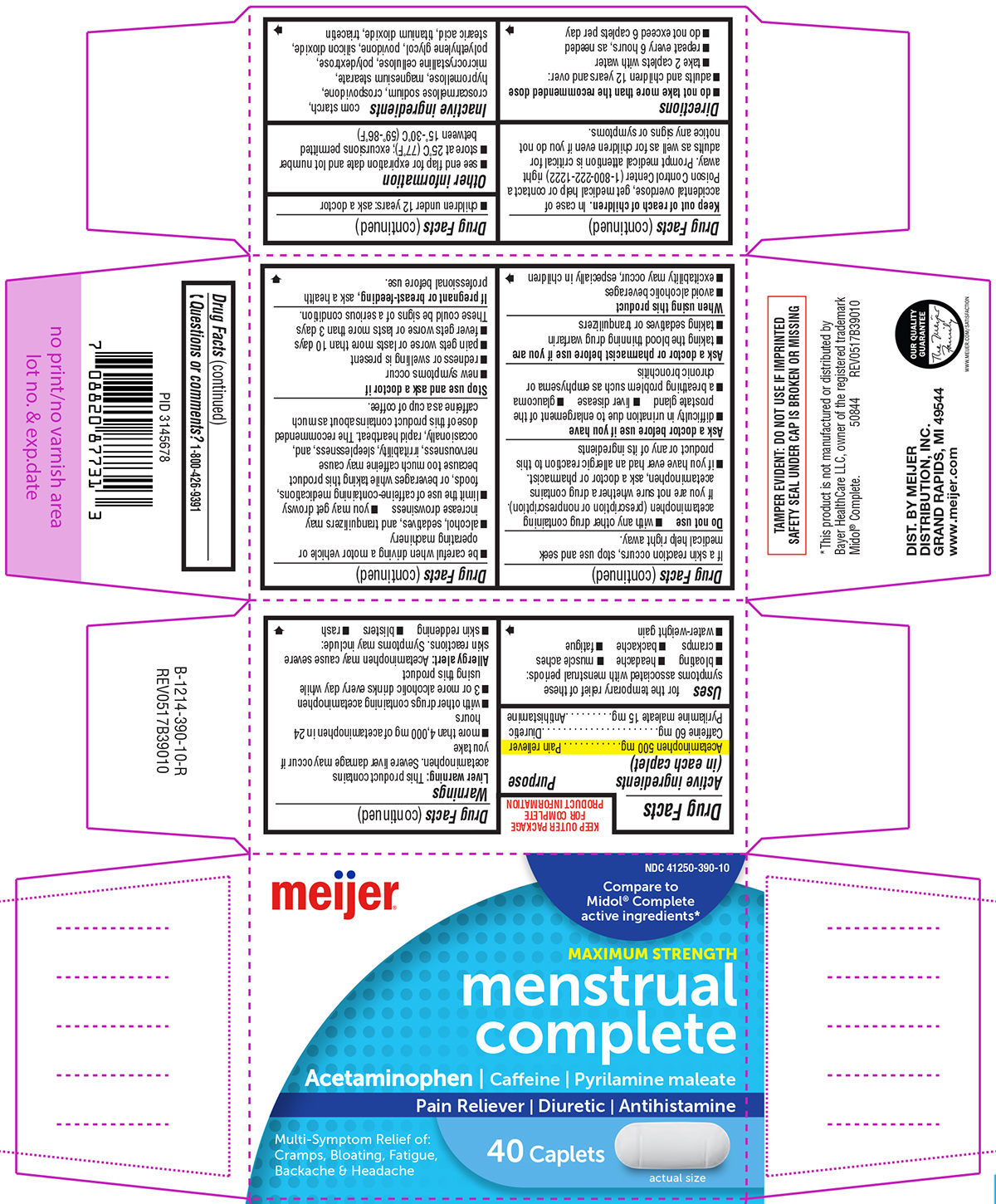Menstrual Complete Maximum Strength | Acetaminophen, Caffeine, Pyrilamine Maleate Tablet while Breastfeeding

What is Menstrual Complete Maximum Strength | Acetaminophen, Caffeine, Pyrilamine Maleate Tablet ?
Brief: Pain reliever Diuretic Antihistamine
Can I use Menstrual Complete Maximum Strength | Acetaminophen, Caffeine, Pyrilamine Maleate Tablet while breastfeeding?

Menstrual Complete Maximum Strength | Acetaminophen, Caffeine, Pyrilamine Maleate Tablet Breastfeeding Analsys
Acetaminophen while Breastfeeding
SafeCAS Number: 103-90-2
Excreted in very low amount into breast milk. Infant intake may be lower than 4% of usual pediatric dose. The American Academy of Pediatrics rates it as compatible with Breastfeeding.
Caffeine while Breastfeeding
Low RiskCAS Number: 58-08-2
Trimethylxanthine component which is present in many compounds like decongestant or pain relief drugs (50 to 100 mg per unit) . It is also present in many infusion beverages (coffee, tea, mate, guarana) and other drinks with allegedly energizing properties. See also Coffee, Caffeine (beverages). At a dose higher than 300 mg a-day may induce nervousness and irritability in the infant. Intravenous high doses used to treat post-epidural anesthesia headache within 2-3 days after delivery, before mature breast milk comes, are compatible with breastfeeding. High doses used Intravenously to treat headache related to epidural should be regarded as compatible with breastfeeding only in the 2-3 days before milk comes in. Elimination period may last from few hours in adults, to 3-4 days in the newborn infant. American Academy of Pediatrics: Maternal Medication Usually Compatible With Breastfeeding.
Pyrilamine maleate while Breastfeeding
Low RiskCAS Number: 59-33-6
First generation antihistamine with sedative and important antimuscarinic effects. Such remarkable anticholinergic effect may inhibit lactation. At latest update no published data on excretion into breast milk were found. Drug with poor scientific support which is marketed in very few countries.Marketed as part of in many “at the counter” compounds in association poliasociación with expectorants, bronchodilators, antitussives, etc. Avoid the use of drug associations mostly while breastfeeding. Although occasional and moderate use during lactation would probably not pose a serious risk, a safer alternative should be preferred until more data on this drug related to breastfeeding is available. Topically used on the skin, it would not represent a risk during breastfeeding. Avoid applying it on the breast. Assess the child for drowsiness and inappropriate infant feeding.It is not recommended bed-sharing with your baby if you are on this medication.
Menstrual Complete Maximum Strength | Acetaminophen, Caffeine, Pyrilamine Maleate Tablet Breastfeeding Analsys - 2
Acetaminophen while Breastfeeding
CAS Number: 103-90-2
Acetaminophen is a good choice for analgesia, and fever reduction in nursing mothers. Amounts in milk are much less than doses usually given to infants. Adverse effects in breastfed infants appear to be rare.
Caffeine while Breastfeeding
CAS Number: 58-08-2
Caffeine appears in breastmilk rapidly after maternal ingestion. Insufficient high-quality data are available to make good evidence-based recommendations on safe maternal caffeine consumption.[1] Fussiness, jitteriness and poor sleep patterns have been reported in the infants of mothers with very high caffeine intakes equivalent to about 10 or more cups of coffee daily. Studies in mothers taking 5 cups of coffee daily found no stimulation in breastfed infants 3 weeks of age and older. Some experts feel that a maternal intake limit of 300 mg daily might be a safe level of intake.[2] However, preterm and younger newborn infants metabolize caffeine very slowly and may have serum levels of caffeine and other active caffeine metabolites similar to their mothers' levels,[2][3][4] so a lower intake level preferable in the mothers of these infants. Other sources of caffeine, such as cola and energy drinks, yerba mate or guarana, will have similar dose-related effects on the breastfed infant. Coffee intake of more than 450 mL daily may decrease breastmilk iron concentrations and result in mild iron deficiency anemia in some breastfed infants.[5]
What should I do if already breastfed my kid after using Menstrual Complete Maximum Strength | Acetaminophen, Caffeine, Pyrilamine Maleate Tablet?
During whole lactation period you shall first discuss with your doctor and then together you shall decide whether you shall take that drug or not however if you have already taken Menstrual Complete Maximum Strength | Acetaminophen, Caffeine, Pyrilamine Maleate Tablet then you shall inform your doctor, But you should not be worried too much as Menstrual Complete Maximum Strength | Acetaminophen, Caffeine, Pyrilamine Maleate Tablet comes in category of low risk drug.
My doctor has prescribed me Menstrual Complete Maximum Strength | Acetaminophen, Caffeine, Pyrilamine Maleate Tablet, what should I do?
Though Menstrual Complete Maximum Strength | Acetaminophen, Caffeine, Pyrilamine Maleate Tablet dose not comes in category of safe drugs rather it comes in category of low risk but if your doctor is aware that you are breastfeeding your baby and has still recommended it then its advantages must be outweighing the risks.
If I am using Menstrual Complete Maximum Strength | Acetaminophen, Caffeine, Pyrilamine Maleate Tablet, will my baby need extra monitoring?
Not much
Who can I talk to if I have questions about usage of Menstrual Complete Maximum Strength | Acetaminophen, Caffeine, Pyrilamine Maleate Tablet in breastfeeding?
US
National Womens Health and Breastfeeding Helpline: 800-994-9662 (TDD 888-220-5446) 9 a.m. and 6 p.m. ET, Monday through Friday
UK
National Breastfeeding Helpline: 0300-100-0212 9.30am to 9.30pm, daily
Association of Breastfeeding Mothers: 0300-330-5453
La Leche League: 0345-120-2918
The Breastfeeding Network supporter line in Bengali and Sylheti: 0300-456-2421
National Childbirth Trust (NCT): 0300-330-0700
Australia
National Breastfeeding Helpline: 1800-686-268 24 hours a day, 7 days a week
Canada
Telehealth Ontario for breastfeeding: 1-866-797-0000 24 hours a day, 7 days a week
